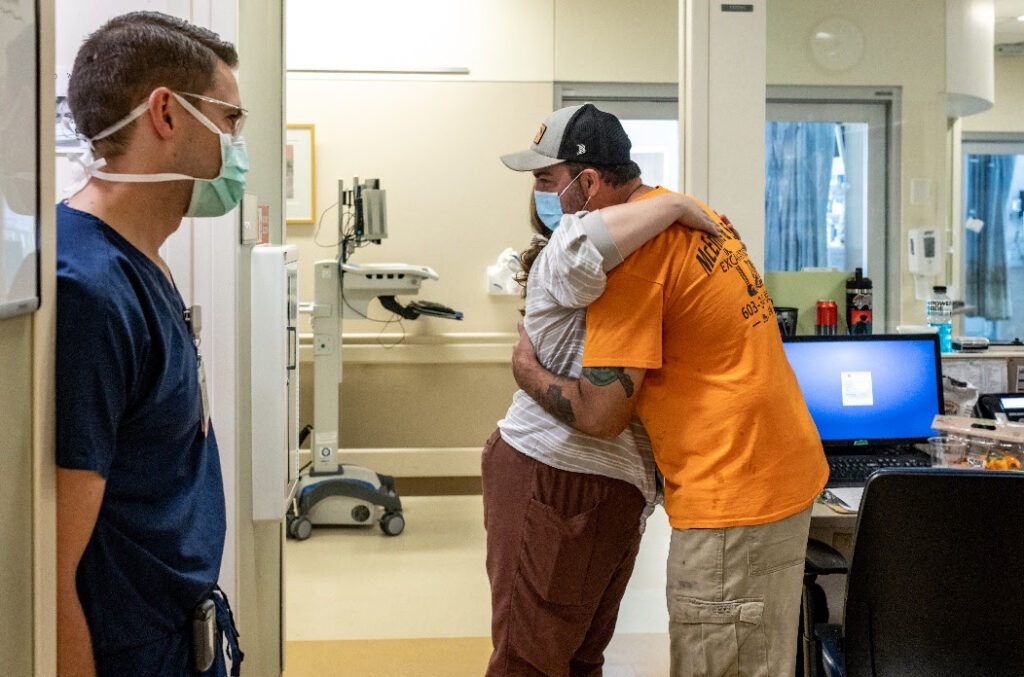From Dartmouth Health:
Treatments and mitigation strategies for COVID-19—and even the existence of the virus itself—have been questioned, condemned and politicized since 2020, due to rampant misinformation. Mark McEnnis once counted himself among the millions of Americans who was against COVID shutdowns and vaccination, until it nearly took his life.
“I really don’t believe anything I hear and about half of what I see, so I was against getting the vaccine,” McEnnis said. He was unvaccinated against COVID-19 and had no prior health issues when he contracted the Delta strain in August 2021. He didn’t think much of it at the time and planned to take a week or two off work, get some chores done at home, and then get back to work at his excavation business. But things did not go as planned.
“I ended up staying in bed for a week with a very high fever,” McEnnis, 39, a resident of Mason, NH, recalled. “I couldn’t move much and my wife noticed I was struggling to breathe. My oxygen was in the lower 90s.”
McEnnis was admitted to a hospital in Nashua, NH, but after a week of treatment, his condition had worsened. He was transported via DHART helicopter to Dartmouth Health’s Dartmouth Hitchcock Medical Center (DHMC), where he began extracorporeal membrane oxygenation (ECMO) treatment. ECMO is a specialized treatment available in few hospitals which uses a pump to circulate blood through an artificial lung back into the bloodstream. At 41 days, McEnnis’ ECMO circuit is the second-longest on record at DHMC’s medical intensive care unit (MICU).

“They told my wife on at least two to four occasions, ‘That’s it. Say goodbye,’” said McEnnis, who shares three children with his wife, Pam. “She called everybody I knew. They all came, said their peace, whatever they wanted to say. And then, miraculously, the next day, I started to come out of it.”
That was in late October of 2021. During his treatment, McEnnis suffered multiple infections, extending his ECMO circuit and leading to four of his fingers being partially amputated.
Donald J. Perrault, MSN, APRN, a nurse practitioner in the MICU, said McEnnis’ time in the unit coincided with “the darkest time that this unit has probably ever experienced.”
“There were people dying left and right,” Perreault said. “To see a guy like Mark with a family like his pull through the absolute rock bottom that this disease can present with, and not result in death, was a real rallying point for everybody in the MICU.”
Samantha E. Daniels, RN, a clinical nurse in the MICU who treated McEnnis, had just started her nursing career at DHMC in 2020 with the pandemic underway. “It was a very difficult time, so to see somebody make it out like Mark did was really good,” Daniels said.
After his miraculous recovery, McEnnis says he is deeply grateful for the staff at DHMC who he credits with saving his life, and not taking anything for granted.
“It’s totally changed my outlook on life,” McEnnis said. “I appreciate every day, every second that I have with my family. Trying to work less and do more things with the family…I always thought maybe work wouldn’t be there next year. I never thought maybe I wouldn’t be there next year.”
It’s also changed his outlook on vaccines. After his ordeal, McEnnis was vaccinated against COVID-19, and urges anyone who hasn’t gotten the shots, or isn’t up to date on their boosters, to do so as soon as possible and avoid the worst outcomes of COVID-19, as he came dangerously close to.
“I know in my personal experience that probably 50 or 60 people that were against the vaccines immediately went out and got vaccinated, because of me,” McEnnis said. “I would just say get it, because the alternative might be the end of it.”
McEnnis visited the DHMC MICU in September to personally thank the medical team who cared for him. Clips from his visit and soundbites from McEnnis, Perreault and Daniels are available for download here, and are cleared for use on broadcast and digital platforms with credit to Dartmouth Health.

 Return to the Concord Monitor
Return to the Concord Monitor